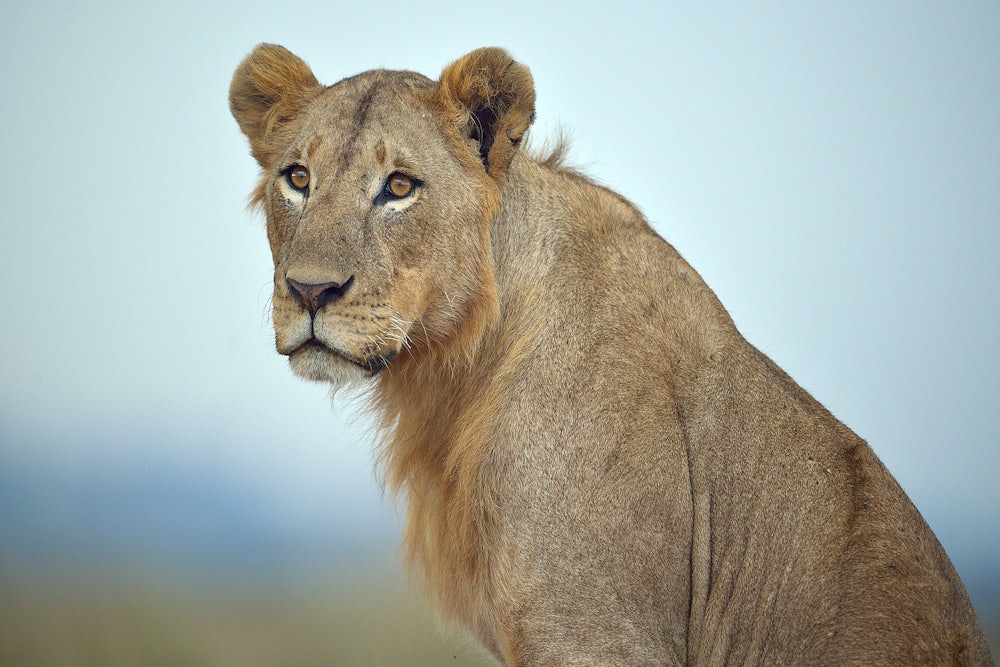President Donald Trump’s proposal last month to weaken the Endangered Species Act has sparked a familiar debate. Environmentalists say he’s shilling for the fossil fuel and logging industries, which seek to exploit federally protected land. Those industries say environmentalists are overreacting—that loosening the law’s requirements will allow economic development alongside species protection.
But one group with a big stake in the Endangered Species Act’s future hasn’t caught much attention. Trophy hunters—those who hunt large, often endangered or threatened wild animals in order to keep and display their carcasses—are applauding the idea of a weakened Endangered Species Act, which may make it easier to import dead leopards, giraffes, and other exotic animals to the United States.
The law, which was passed in 1973, bans the import of trophies for endangered or threatened species. The Trump administration, however, is proposing to repeal automatic protection for the latter category. (Threatened species are at less risk of extinction than endangered species.) If that happened, any newly designated threatened species would not receive protection from trophy hunting unless the Trump administration created a special regulation.
Animals rights advocates say this is particularly worrisome for the giraffe. As the population of the world’s tallest mammal has plummeted, groups have petitioned for the giraffe to be protected under the Endangered Species Act. It’s likely that the giraffe will only be granted threatened status—meaning it won’t get trophy hunting protections. Giraffe trophies are highly sought after by Americans, with an average of around one animal imported per day, according to NPR.
If the proposed change to the Endangered Species Act goes through, it would be just the latest favor to the trophy hunting community. Under Interior Secretary Ryan Zinke, the U.S. Fish and Wildlife Service has reversed a host of bans on big-game imports, including elephant and lion carcasses from several African countries including Zimbabwe and Zambia. As such, Zinke has granted more than three dozen import permits for dead lions, some from previously banned countries, during his tenure. Zinke has also created an wildlife conservation council for the sole purpose of promoting trophy hunting, and stacked it with trophy hunters and gun advocates.
Taken together, animals rights activists say, these actions have created the most friendly policy environment for trophy hunting in at least a decade.
This is not what the trophy hunting community expected of Trump, despite his two eldest sons’ affinity for the practice. Last year, he tweeted:
Big-game trophy decision will be announced next week but will be very hard pressed to change my mind that this horror show in any way helps conservation of Elephants or any other animal.
— Donald J. Trump (@realDonaldTrump) November 19, 2017
Trump has argued elsewhere against the conservation argument for trophy hunting, which is thus: Hunters pay large sums of money to governments and conservation organizations for the privilege of hunting the animals, thus helping to fund the management and protection of the species. “People can talk all they want about preservation and all of the things that they’re saying where money goes toward,” Trump told Piers Morgan in January. He said that foreign governments probably don’t use the money properly.
Why, then, would Zinke continue on this crusade? “Safari Club International has fully infiltrated this administration,” said Anna Frostic, a senior wildlife attorney at the Humane Society, referring to the international hunting group (of which Walter Palmer, who killed Cecil the Lion in Zimbabwe in 2015, was a member).
Zinke, a lifelong hunter, has longstanding ties to SCI, stemming back to his days in Congress. He received $14,5000 in congressional campaign donations from the group, “spoke at [its] 2016 veterans breakfast, had a notable photo-op with its director of litigation on his first day as head of the Interior Department, and dined with its vice president in Alaska earlier this year,” according to HuffPost. Zinke is close with other hunting advocacy groups, too. Last summer, he received a policy wish list from eight trophy hunting organizations, asking him to roll back several Obama-era regulations on the practice.
Today, Zinke is making progress on that wish list. He’s already accomplished the first ask—to reverse the ban on lion and elephant trophies. Now, he’s working on the second request—to repeal the automatic trophy hunting protection for threatened species. The wish list, according to HuffPost, also asked Zinke “to reject a petition calling on the U.S. Fish and Wildlife Service to list all African leopards as endangered under the ESA and restrict hunters from importing their parts,” and it “called for Zinke to revise seizure and forfeiture practices that they say ‘discourage lawful tourist hunting.’”
The impact of Zinke’s policies is opaque, though, because the Fish and Wildlife Service won’t say how many animal trophies are being imported into the U.S., and who is importing them. “I’ve routinely submitted FOIA requests for precisely that information,” Frostic said. “I still don’t have a full request fulfilled from May of 2017.” Last month, the group Friends of Animals obtained documents showing that 38 lion trophies had been imported between 2016 and 2018. Of the 33 people who imported those trophies, at least half had donated to Republican lawmakers or were affiliated with SCI, the group claimed.
These actions haven’t gone completely unnoticed. In March, dozens of House Democrats sent a letter to Zinke, asking that he “halt all trophy imports, initiate a full regulatory process for the policies, make license issuances public and require annual reports from countries where FWS will allow imports,” according to The Hill. Two Democratic senators sent a similar letter. Animal welfare groups have filed legal actions against the Interior Department, too, over its decision to allow elephant trophy imports and its pro-hunting wildlife conservation council.
Trump, meanwhile, has been uncharacteristically silent on the matter.
